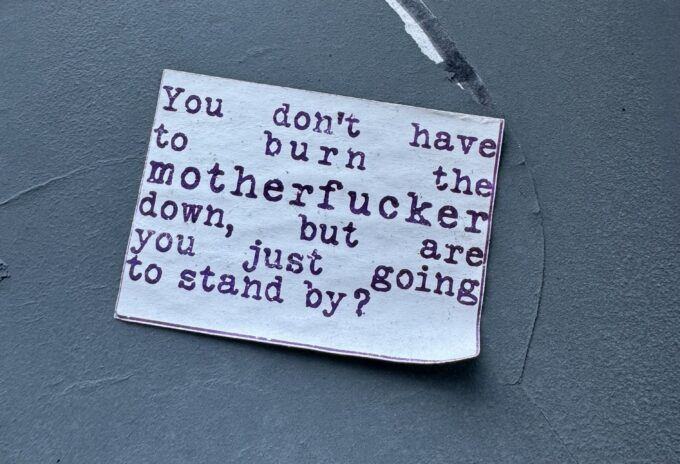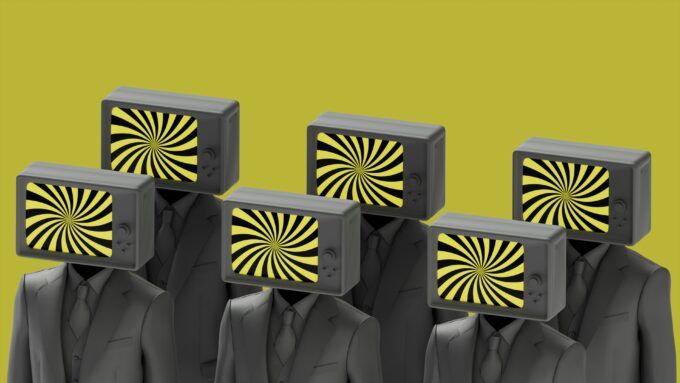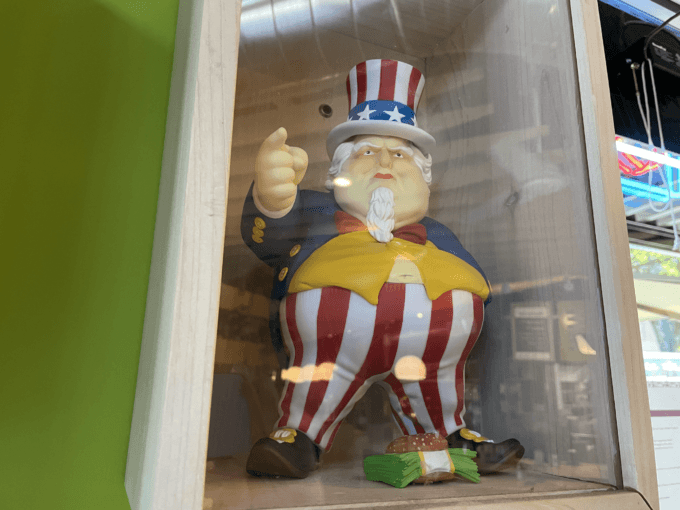
Dinesh-DSouza
Published on http://truth-out.org
I declined my recent invitation to join the Mad Hatter’s Tea Party, which came in the form of conservative Dinesh D’Souza’s tweet: “Which is worse: EBOLA, the disease; or OBOLA, the dream from his father?” Actually, I am still attending the ISIS fear, which remains a more likely lunacy to wreak havoc over a longer period than Ebola, and more likely to detour us from noting that our middle-class democracy has turned into gentrified real estate for plutarchs.
We are presently living at a time when the world is being branded in ways that benefit globalized techno-capitalism, but not at a time when the job has, as in Huxley’s Brave New World, been completed. Globalized techno-capitalism owns the future when it totally owns the spin-making machinery, but cyberspace has shown that while it can make a solipsist out of everyone, it also can spin as wildly as any one person can imagine. It can spin in an anti-globalization way. It can spin toward interpretation of Occupy Wall Street (OWS), even though OWS has eschewed interpretation of itself and in this way has retreated from the battle of my reasoning/your reasoning. Nevertheless, it had established ground in our psychomachia, a battle within the American cultural psyche. It had established, though briefly, force and presence in that most powerful domain.
You could see a small window opening for a leftist critique of our Market Rule after the crimes of Wall Street and the escape of the criminals involved. Though many still lay like fallen victims, battle preparations in the mass psyche have faded to less than zero. At one time, this week’s headlines wiped from memory last week’s. Now, this day’s hashtag overwrites yesterday’s. But beyond the erasure of a long-term memory, collapsed in the face of a present overwhelmingly full, a surge in the market has once again relegated any critique from the left as irrelevant and wrong-headed. But as that surge in the Dow Jones fails to reach some 80 percent of the population, and the vicarious joy of the Many in the success of the Few cannot be counted on, a fear that overshadows any emerging fear of an out-of-control Wall Street financial cabal is sought.
Fear in the mass psyche trumps any slow gathering of evidence confirming that what was once a democracy is now a plutarchy. The legislators who would be gathering this evidence are countered by those who only bear witness against Mr. Romney’s “Moochers.” And, it seems that after the November Congressional elections, any legislation in force or proposed that attempts to regain what plutarchy has taken would be in jeopardy. It is very difficult to summon a rational case explaining why some 40 percent of the population discarded by the economic system neoliberals enforce and a middle 40 percent on their way to joining that bottom 40 percent would somehow bring into being and sustain a plutarchy. It would be far easier to make a rational case as to why the Many should now be arming themselves with a socialist critique of plutarchy.
This is, however, a ludicrous and incomprehensible assertion, not because it is irrational, but because it defies the “rationality,” if you will, within the American mass psyche, as it presently exists. It totally misconstrues the Americanpsychomachia, the psychic battle, that neoliberals have been winning, a battle in which they own the field. Every manifestation of a vestige of socialism whether in Scandinavia or Cuba or South America, or in American university faculties, or in workers’ unions, or in co-operatives of any stripe, has been greeted with amused disdain, with the patience of a parent confronted with a slow-learning child, with the pity the sighted have for those who cannot see. This is only explicable within a psychic scenario whose rules are those of Wonderland. A mocking disdain of socialist critique is, however, not as forceful in our psychic battle because it lacks real subliminal potency, the kind that fear, in all its forms, can provide.
To demonize on this psychic level, in our cultural imaginations, the target must be presented as a threat and a fear of that threat kept on the boil. It is very difficult to deal with those who are frightened; reason cannot get them out of a place into which they have not reasoned themselves. “The term Red Scare,” the anonymous group-write of Wikipedia informs us, “denotes two distinct periods of strong anti-Communism in the United States: the First Red Scare, from 1919 to 1921, and the Second Red Scare, from 1947 to 1957. The First Red Scare was about worker (socialist) revolution and political radicalism. The Second Red Scare was focused on national and foreign communists influencing society, infiltrating the federal government, or both.”
After 9/11, 2001, the Red Scare was transformed into the “Al-Qaeda Scare,” a fear that opened a door to great profiteering as warfare – quite blatantly now the new marketing frontier – became privatized, and brought to life a Patriot Act that curtailed civil liberties with one fell swoop. Once again, the Wiki Oracle:
The act, a response to the terrorist attacks of September 11th, dramatically reduced restrictions in law enforcement agencies’ gathering of intelligence within the United States; expanded the Secretary of the Treasury’s authority to regulate financial transactions, particularly those involving foreign individuals and entities; and broadened the discretion of law enforcement and immigration authorities in detaining and deporting immigrants suspected of terrorism-related acts. The act also expanded the definition of terrorism to include domestic terrorism, thus enlarging the number of activities to which the USA PATRIOT Act’s expanded law enforcement powers can be applied.
On May 26, 2011, President Barack Obama signed a four-year extension of three key provisions in the USA PATRIOT Act:[2] approving wiretaps, searches of business records (the “library records provision“), and conducting surveillance of “lone wolves” – individuals suspected of terrorist-related activities not linked to terrorist groups.
The potency of an “Islamofascist” fear had slowly diminished. There had been no subsequent attacks of 9/11 magnitude on the US homeland. On a psychic terrain geared to nano/tweet speed, what is no longer present, no longer exists. Also, an economic system focused on the short-term and not the long-term (one explanation of the failure of global warming to make a deep fearful attachment in the American cultural imaginary) has great difficulty in keeping the fires burning when it advocates a “creative destruction” of both the past and memory.
However, there is great energy expended to keep fear, in whatever form, a terrifying player in the psychomachia because if it is true that war, privatized as it has been in Iraq and Afghanistan, is a lucrative business of globalized capitalism, fear is a most effective force to transform even the most Mad Hatter war cries into rational justification. The cultural imaginary feeds on the necessity of survival when confronted with terrorist fear and is magnetized not by dissent, but by defense. If the neoliberal spin-making machine had worked as strenuously to implant a fear of human-caused global warming into this imaginary, the chances of the survival of much life presently on the planet would be better than they are now. Unfortunately, it is only fabricated fear and survival that benefit short-term profit seekers. Causes for real fear are always also conducive to profit loss and thus are denied as real.
The death of bin Laden serves also on this psychic level as an ending, much as the fall of the Soviet Union served as an ending to all leftist politics in the American cultural imaginary. Most importantly, however, may be the Great Recession of 2008 and the much too obvious, though always recessed, villain in the piece: Wall Street and the excesses of a vulture capitalism that have brought an obscene amount of wealth to a few and great woe to a great many. In short, we now have a Wall Street Scare on our psychic horizon that means capitalism is once again on our psychomachia stage as a villain. Enter stage left, ISIS, from out of the confusion of Syria’s go at an “Arab Spring.”
Consider US involvement with ISIS away from our place at the Mad Hatter’s Tea Party and try to engage it as if we were somehow not on the battlefield of the American cultural psyche but somehow outside it. In many ways, it is President Obama’s position. Invited to attend the Syria revolt against Assad, he declined. In an interview, Obama presented a view of that revolt that made sense, but not, as it turned out, from within our psychomachia:
[T]he notion that arming the rebels would have made a difference has always been a fantasy. This idea that we could provide some light arms or even more sophisticated arms to what was essentially an opposition made up of former doctors, farmers, pharmacists and so forth, and that they were going to be able to battle not only a well-armed state but also a well-armed state backed by Russia, backed by Iran, a battle-hardened Hezbollah, that was never in the cards. (Interview with Thomas Friedman, The New York Times, August 8, 2014.)
The leverage against the president’s reasoning came from the ISIS threat in Iraq and the president’s failure to push Maliki in 2011 into an agreement that would have left US combat forces in Iraq and thus might have stopped ISIS from becoming the threat it has become in Iraq. Obama could not outrun the nightmare legacy of an Iraq war never planned and executed outside the Mad Hatter’s Tea Party and fought on a battlefield of a cultural psyche far removed from the reach of a conscious rationality. What was proposed in a pathological realm resulted in the real world deaths over an 11-year period of close to 190,000 people. Over 4,000 US soldiers died, and the cost of the war over the next four decades, as benefits to veterans continue, could amount to $6 trillion dollars.
And so Obama was drawn back to the Mad Hatter’s table to engineer a strategy whereby:
• He could avoid putting US boots on the ground;
• He could enlist “moderate rebels” fighting Assad who may never have existed;
• He could avoid joining with al-Nusra, affiliated with al-Qaeda, in the fight against Assad;
• He could avoid joining with Iran and Hezbollah, who are supporting Assad but fighting ISIS;
• He could mobilize an Iraq military trained by the United States at a cost of billions of dollars, but who are more inclined to run home than fight for a nation only Westerners recognize as a nation;
• He could avoid a too obvious and significant support of the Kurds, the only effective boots on the ground;
• He could enlist the Kurds to fight for the United States, while the US fights the Kurds’ independence from Iraq for fear of dismantling an illusionary “nation” that has, like Afghanistan, never risen above religious and tribal factionalism.
There are no winners and no possibility of winning anything here except if by “here” we mean our psychic battlefield where ISIS is what we now fear. Rick Perry has reported that there is a very real possibility that ISIS has crossed the Mexican border. This is a kind of win/win situation for neoliberals: fear of illegal Mexicans crossing the border and ISIS aliens joining them. The Latinos just want to replace English with Spanish, take our jobs and “brown” America, while ISIS wants to cut off our heads.
Fear unites us around the Mad Hatter’s table, kicks up our American Market Rule exceptionalism to the max and thus yet again stifles the birth of any leftist critique, and, finally, makes those plutarchs with military contracts reap their winnings while the inevitable US “boots on the ground” pay the ultimate price.
We should all vote to decline this invitation and redirect useful energy toward revisiting the scene of the Great Recession crime, arm ourselves with a real critique of our plutarchy’s modus operandi and win on a real battlefield other than a mass psyche overloaded with fears.














